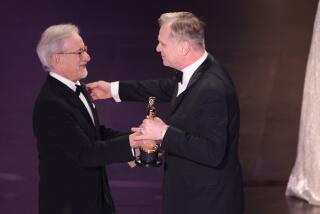10 best documentaries of 2013, and the new crop in 2014
The first months of the year are, by consensus, the bleakest of cinematic times. But not so much if, like me, you are a lover of documentaries, someone who revels in the pleasures of the nonfiction film.
Proofs of the remarkable strength of documentaries in this day and age are manifold right around now. If you were fortunate enough to go to last month’s Sundance, for instance, a prime nonfiction showcase that this year screened some 40 documentaries from around the world, you got a peek at the best of what 2014 will offer.
Now is also a good time to look back on 2013 and pay attention to the splendors now available for home viewing. And with the documentary Oscar to be awarded in just a few weeks, talk about the nominated films is coming to a boil. I should be in seventh heaven, and, with one worrying exception, I am.
BEST MOVIES OF 2013: Turan | Sharkey | Olsen
To start with Sundance, the festival’s always-affecting documentaries were especially welcome this year because the narrative films did not offer any knockout blows. Sure to make themselves known in the coming year are the following half-dozen documentaries to keep an eye out for:
“The Green Prince” A gripping tale of how a member of the Hamas hierarchy became a spy for Israel’s Shin Bet.
“Happy Valley” A devastating look beneath the surface of the Jerry Sandusky child abuse scandal at Penn State.
“The Internet’s Own Boy: The Story of Aaron Swartz” A passionate documentary on the computer prodigy and champion of open access whose tragic suicide led to an international outcry.
“Life Itself” A moving examination of the life, especially the last few months, of celebrated film critic Roger Ebert.
“The Overnighters” A film about hope, acceptance and the limits of the American dream set in a small North Dakota town during the fracking boom.
PHOTOS: Box office top 10 of 2013
“We Come As Friends” Provocative and unapologetically political filmmaker Hubert Sauper returns to the kind of African situations that characterized his Oscar-nominated “Darwin’s Nightmare.”
Strong as these films are, the documentaries on offer in 2013 were just as good if not more so. About a month ago I promised to put together a 10-best-documentaries list for the year, and I am nothing if not a man of my word. To begin:
“After Tiller” Examines the steadfastness in the face of great obstacles of the only four American doctors who continue to provide late-term abortions after the murder of Dr. George Tiller.
“Blackfish” Gripping and revelatory in its discovery of the reasons behind captive orcas’ attacks.
“First Cousin Once Removed” A portrait of a once-formidable intelligence descending into the abyss of Alzheimer’s that is heartbreaking and unexpectedly heartening.
“God Loves Uganda” An expose of how evangelical fundamentalists are using Christianity to demonize homosexuality in this African country.
PHOTOS: Billion-dollar movie club
“Let the Fire Burn” A brooding documentary about the 1983 MOVE inferno in Philadelphia that earns its impact by telling an unnerving story and leaving it unresolved.
“The Summit” The white-knuckle tale of an expedition to K2, the second-highest peak in the world, in which 11 people died.
“The Trials of Muhammad Ali” A presentation of the life of the three-time heavyweight champion from the unusual point of view of his religious and political beliefs and actions outside the ring.
The remaining three of my 10 best documentaries are the pick of the crop of the five films nominated for the documentary Oscar:
“The Act of Killing” A mind-bending film, devastating and disorienting, whose examination of a massive anti-Communist slaughter in Indonesia raises all kinds of unexpected questions.
“The Square” A compelling inside look at the cascading series of revolutions and counterrevolutions that have shaken Egypt since the beginning of 2011.
PHOTOS: Greatest box office flops
“20 Feet From Stardom” This warmly appealing look at rock’s premier backup singers features powerhouse vocals from the likes of Darlene Love, Merry Clayton and Lisa Fischer.
Though the entire Oscar documentary field (the other two are “Cutie and the Boxer” and “Dirty Wars”) is more than worthy, there is an exclusion that has troubled me from Day 1, not just because the Film That Dare Not Speak Its Name is as good as any of these and better than some but because of the narrowness of reasoning that likely kept it off the academy’s list.
That would be Sarah Polley’s “Stories We Tell,” an invigorating powerhouse of a personal documentary that was so adventurous and compelling that its absence from the final five was something of a shock.
How often, after all, do we see a film, structured around Polley’s investigations of her own family background, that ponders intriguing questions about the ownership of personal history, the function of art in telling the truth, the nature of documentary and how what we consider to be reality may in truth be no more than what we want to believe?
You don’t have to take my word about the qualities of this film; it was good enough to be one of five nominees for the Directors Guild’s best documentary award (the award went to Jehane Noujaim’s “The Square”). So what kept it off Oscar’s final list?
The best guess Oscar watchers and academy members have about the exclusion is that Polley was penalized for her film’s very adroit and artful use of re-creations that are eventually but not immediately revealed.
This was apparently too much for the purists in the branch, and this is understandable yet somehow disheartening. I am certainly not a wild-and-crazy, anything-goes type, but I would like to believe that whatever tools a documentary uses should be evaluated in the context of what resulted.
To narrowly exclude a film as smart and moving as “Stories We Tell” because of a feeling that it is not a “true documentary” feels like cutting off your nose to spite your face, an act defensible in theory but inexcusable when confronted with the splendid reality of Polley’s film. There are no do-overs in Oscarland, but this is one time I wish there were.
More to Read
Only good movies
Get the Indie Focus newsletter, Mark Olsen's weekly guide to the world of cinema.
You may occasionally receive promotional content from the Los Angeles Times.







